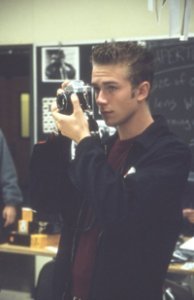Elephant
An ordinary high school day. Except that it's not.

|
There is a school of thought which says that the rise in increasingly violent human behaviour is heavily influenced by increasingly violent action-films, but is it as clear cut as this and could it be a case of the chicken vs the egg? Certainly, this film portrays an incident not dissimilar as that which happened at Columbine High, Littleton, Colorado, USA. The only violence in this film is that many innocent people are shot dead; it isn't violent in the way it presents those deaths.
The title is taken from Alan Clarke's "Elephant", a BBC TV film that presented, without any commentary, a succession of killings in Northern Ireland and this is the only indication of what might happen. The unassuming nature of this film starts with the tracking of various students and staff as they arrive at the school and go about their daily routines, and continues with long tracking shots; the film simply watches the day's events unfold.
From the bespectacled librarian girl to the trio of popular girls obsessed with friendship and slimming, the students at this school seem perfectly normal, except for two boys, Alex (Frost) and Eric (Deulen). Acting without any remorse, rage, bitterness or obvious emotion of any kind, they arrive at school with suspicious-looking bags.
In flashbacks that are virtually indistinguishable from the present, we see this pair of outsiders prepare for their massacre. Alex pounds out Beethoven on a piano while Eric kills people in a video game. They watch a TV documentary about the Nazis, order automatic rifles on the Internet and receive these weapons in the post. They try out the weapons on a pile of logs in the garage and they shower together in what seems less a sexual act than a cleansing ritual. What to others will seem like random slaughter is to them a meticulously planned military exercise.
With a cast where all the teenagers in the film are non-professionals and share their real names with the characters they play, and along with his cinematographer Harris Savides, acclaimed director Gus Van Sant has crafted a dramatic and stunningly effective film. He takes the viewer through a range of locations which are disconcertingly serene; drifting through classrooms, offices, and along corridors, creating an almost weightless experience. Furthermore, there is no tension-heightening or thrilling score, again giving no hint of what is to come.
Van Sant himself admits to not knowing why the two killers acted like they did, and this film provoked lots of debate upon its original release. Even more so when this film picked up the Palme d'Or and the best director award at Cannes. It offers no explanation for the tragedy, no insights into the psyches of the killers, no theories about teenagers or society or guns or psychopathic behavior. It simply looks at the day as it unfolds, and that is a brave and radical act; it refuses to supply reasons and assign cures. Indeed, the intention is not to invite the viewer to feel the difference between the tragic nightmare unleashed by the killings and the innocent world that existed until that point. This is done by fracturing time - visiting and revisiting characters and events from differing angles. The result is a film constructed such that it cannot be for certain when and where the shootings begin.
This is an excellent example of storytelling - a film you should not miss!
Alex Coe
More Information | Back to Previous Schedule | This Season | BBFC Classification Guidelines
Screenings of this film:
| 2003/2004 Summer Term – (35mm) |


